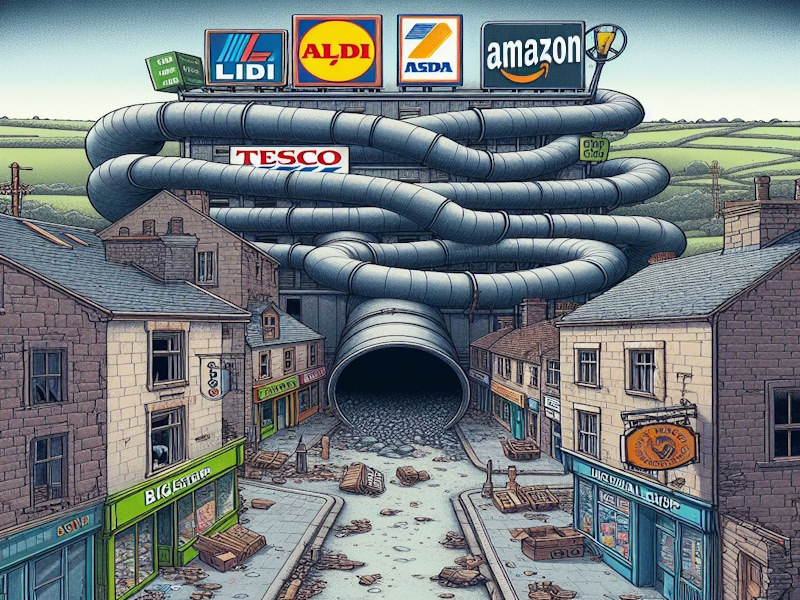Why Economic Monocultures Are Failing Us All:
In today’s global economy, a small number of massive corporations hold sway over entire industries. online Giants like Amazon eBay, Google, Facebook and Big Box Retailers dominate their sectors, reshaping markets, influencing consumer behavior, and even dictating government policies. This kind of corporate dominance creates economic monocultures—a troubling scenario that mirrors the environmental impact of biological monocultures.
Imagine a forest where the only plants are California Giant Redwoods and Sequoias, with no other flora to support the ecosystem. These towering trees would quickly outcompete other species for resources, blocking sunlight and preventing growth on the forest floor. However, unlike large corporations, Redwoods and Sequoias don’t deplete the forest’s nutrients and remove them to far-off places; they return nutrients to the soil below them, supporting their local ecosystem. This distinction is key. Corporations like Amazon, on the other hand, extract wealth from local communities and transfer it to shareholders, vendors, and operations in other regions or countries, leaving local economies impoverished.
At Getslocal, our mission is to provide a holistic, long-term solution for local businesses and economies. Through a series of business tools and programs, we empower small enterprises to thrive and contribute to the health of local economies. This approach stands in direct contrast to the concentration of power and wealth in a few large corporations that drain local communities of their financial resources.
Corporate Dominance: Parallels Between Nature and Economy
Amazon Rainforest vs. Amazon the Corporation:
The Amazon Rainforest is a quintessential example of ecological diversity. Its vast array of plants, animals, and microorganisms supports a robust and balanced ecosystem. Every species contributes to the health of the forest, making it resilient to changes and disruptions. This diversity ensures the forest’s longevity and vitality.
In contrast, Amazon the Corporation illustrates the dangers of a lack of economic diversity. From its origins as an online bookstore, Amazon has evolved into a global e-commerce and logistics giant, overshadowing local businesses and concentrating economic power. Just as a forest dominated by a single type of tree would collapse, an economy controlled by a few corporations becomes fragile and vulnerable. The absence of economic diversity reduces innovation and community vitality, similar to how the lack of plant diversity in a forest can lead to ecological collapse.
The real danger of these corporate giants lies not only in their dominance but also in the way they siphon off wealth from local communities. Amazon and other large corporations engage with foreign vendors, removing the local circulation of money and thereby reducing the velocity of money, which is critical for local economic growth. The analogy with Redwoods and Sequoias only goes so far because, unlike these trees that return nutrients to the local ecosystem, corporations like Amazon extract resources and provide little benefit in return.
At Getslocal, we’ve created business tools specifically designed to help local businesses compete and grow. These tools include digital marketing support, e-commerce integration, and customer loyalty programs—all focused on ensuring small businesses remain a vital part of the economic ecosystem.
Key Point: A healthy economy, much like a thriving ecosystem, depends on diversity. The concentration of power in the hands of a few corporations undermines economic resilience and long term sustainability.
E.F. Schumacher: Economics as if People Mattered
https://en.wikipedia.org/wiki/E._F._Schumacher
Human-Centered Economics and Small Businesses:
E.F. Schumacher, in his influential book Small Is Beautiful: Economics as if People Mattered, championed the idea that economies should serve human needs rather than mere growth and profit. Schumacher argued for human-centered economics, advocating for smaller, more localised economies that are better aligned with community needs and well-being.
Large corporations, Schumacher noted, become disconnected from the real needs of people and communities. They often prioritize efficiency and profit over human dignity and environmental health. In contrast, small businesses are more likely to focus on local needs and sustainability, creating meaningful work and fostering a sense of community. This approach mirrors the balance found in diverse ecosystems, where every component contributes to overall health and resilience.
Getslocal’s programs are built on Schumacher’s principles. Our long-term business strategies prioritize local impact over short-term profits, helping businesses grow in ways that support their communities and promote sustainability.
Key Point: Schumacher’s philosophy aligns with Getslocal’s mission to support small, local businesses that provide meaningful work, strengthen communities, and invest in long-term sustainability.
Dee Hock’s Vision: Reimagining Ownership and Power
https://en.wikipedia.org/wiki/Dee_Hock
A Call for New Economic Structures:
Dee Hock, founder and CEO Emeritus of VISA, called for a fundamental rethinking of economic systems. He stated:
"We must conceive of and help implement wholly new forms of ownership, financial systems, and measurements, free of the attempt to monetize all values that bind (us) to next quarter’s bottom line, gross maldistribution of wealth and power, degradation of people, and desolation of the ecosphere, or our stories will be increasingly immoral and destructive."
Hock’s critique highlights the flaws of current economic models that focus on short-term profits and monetization of every value. This focus leads to wealth concentration, worker exploitation, and environmental degradation. His call for new forms of ownership and financial systems—where wealth and decision-making power are distributed more equitably—reflects a vision for a more balanced and sustainable economy.
Getslocal’s approach echoes Hock’s vision by offering local businesses ownership-based solutions and community investment tools that emphasize long-term value creation over short-term gains. By empowering small businesses to grow sustainably, we contribute to a more resilient and balanced economic future.
Key Point: Hock’s vision challenges existing corporate structures and advocates for new economic models that prioritize people, communities, and the environment over immediate financial gains.
Thomas H. Greco Jr.: The Need for Mutual Credit Systems
https://en.wikipedia.org/wiki/Thomas_H._Greco_Jr.
Why Mutual Credit Systems Are Vital:
Thomas H. Greco Jr., an advocate for community-based economic solutions, emphasizes the importance of mutual credit systems in today’s economy. Greco argues that traditional banking and financial systems are heavily skewed in favor of large institutions, leading to systemic issues such as economic instability, inequality, and exclusion.
Mutual credit systems provide an alternative by allowing businesses and individuals to trade and transact without relying on conventional currency. These systems are based on credit relationships and local exchanges, enabling communities to retain and circulate their financial resources more effectively. By using mutual credit, local businesses can trade goods and services without needing cash, which helps keep money circulating within the community and supports local economic resilience.
This model counters the negative effects of corporate dominance by fostering local self-sufficiency and reducing dependency on external financial systems. It empowers communities to create their own economic solutions and strengthens local networks, much like how a diverse ecosystem supports a broad range of life forms and maintains balance.
At GetsLocal, we recognize the potential of mutual credit systems and incorporate this understanding into our programs. By promoting local currency initiatives and barter systems alongside our other tools, we aim to enhance the financial health and independence of local businesses.
Key Point: Mutual credit systems offer a way to retain financial resources within local communities, supporting economic resilience and reducing dependency on large corporations.
The Environmental and Social Costs of Monopolistic Power
Desolation of the Ecosphere and Moral Decay:
Just as a forest dominated by a single species of tree would collapse, the dominance of a few corporations in our economy leads to significant environmental and social costs. Corporations like Amazon often externalize their environmental impact, contributing to issues like pollution and climate change. The relentless pursuit of efficiency and growth results in environmental harm and social exploitation.
Moreover, large corporations extract wealth from the local economy. When customers buy from Amazon, much of the profit leaves the community, often going to foreign suppliers and far-off corporate headquarters. In contrast, when money circulates through local businesses, it benefits the community as a whole, supporting local jobs, taxes, and services. This “leakage” of wealth, where money leaves the local economy, mirrors how an invasive species can strip nutrients from an ecosystem, preventing it from thriving.
Getslocal’s programs are designed to combat these issues by supporting businesses that prioritize worker welfare, environmental stewardship, and community investment. Our platform helps local businesses implement sustainable practices that benefit both the economy and the environment.
Key Point: The negative impacts of corporate monopolies extend beyond the environment, affecting workers’ dignity and community health, similar to how a lack of biodiversity in an ecosystem leads to broader ecological harm.
Joseph Schumpeter: Corporate Dominance Stifles Innovation
https://en.wikipedia.org/wiki/Joseph_Schumpeter
The Stifling Effect of Monopolies on Creativity and Progress:
Joseph Schumpeter, who introduced the concept of “creative destruction,” argued that innovation is crucial for economic growth. New ideas disrupt outdated models, leading to progress and development. However, when large corporations dominate, they often stifle this innovation by suppressing or absorbing smaller competitors.
Amazon’s dominance in various sectors has created significant barriers for new entrants. Even the most creative startups face challenges not because of a lack of innovation but due to the overwhelming power and resources of established giants. This monopolistic control prevents the economy from evolving and adapting, much like how a lack of ecological diversity can inhibit the natural world’s ability to adapt and thrive.
At Getslocal, we encourage innovation among local businesses by providing them with digital tools, marketing strategies, and resources to compete in an increasingly corporatized world. Our goal is to ensure that small businesses have the opportunity to grow, innovate, and contribute to the diversity of the economy.
Key Point: Schumpeter’s theory underscores the importance of market diversity and innovation, warning against the monopolistic practices that hinder economic progress and creative growth.
The Path Forward: Embracing Localism and Decentralization
Building Resilient, Community-Driven Economies:
At Getslocal, we advocate for localism and decentralization as solutions to the problems caused by corporate dominance. Just as ecosystems thrive on diversity, so too should our economies. By supporting local businesses, and community-driven initiatives, we can foster a more resilient and equitable economic system.
Local economies are less vulnerable to global disruptions and are better equipped to address local needs. They create jobs, reinvest in the community, and contribute to a more sustainable future. Embracing decentralized economic models helps distribute wealth and decision-making power, promoting a healthier and more dynamic marketplace.
Getslocal’s suite of business tools and programs includes everything from local marketing support to customer loyalty programs, all of which are designed to empower local businesses to flourish in their communities. These resources not only help local economies grow but also strengthen the social and environmental fabric of the regions they serve.
Key Point: Localism and decentralization offer a path to a more sustainable and equitable economy, empowering communities and supporting long-term resilience.
Building a Better Economic Ecosystem:
The analogy between natural ecosystems and economic systems is striking. Just as a diverse and balanced ecosystem promotes environmental health, a diverse and balanced economy fosters innovation, sustainability, and resilience. Monopolistic corporate dominance, however, threatens both our economy and our planet.
Getslocal is committed to supporting the small, local businesses that form the backbone of thriving communities. By offering a suite of tools designed to promote sustainability, growth, and long-term success, we are working to create a future where local economies flourish and where economic power is decentralized, benefiting everyone.
Our programs are more than just a response to the challenges posed by large corporations—they are part of a holistic, long-term solution that aims to build a healthier, more equitable, and more sustainable economy for all.
Key Takeaways:
- Corporate Dominance Threatens Economic and Ecological Health: Concentrated corporate power disrupts economic balance, leading to vulnerability and inefficiency.
- Local Economies Are Resilient: Supporting small, community-rooted businesses promotes sustainability and adaptability in the economy.
- New Economic Models Are Necessary: Thought leaders like Dee Hock and E.F. Schumacher call for equitable and decentralized economic systems.
- Monopolies Stifle Innovation: Joseph Schumpeter’s theory of creative destruction highlights the need for diverse and competitive markets to drive progress.
- The Future is Gets Local: Embracing localism and decentralization helps build a more resilient, equitable, and sustainable economy.


